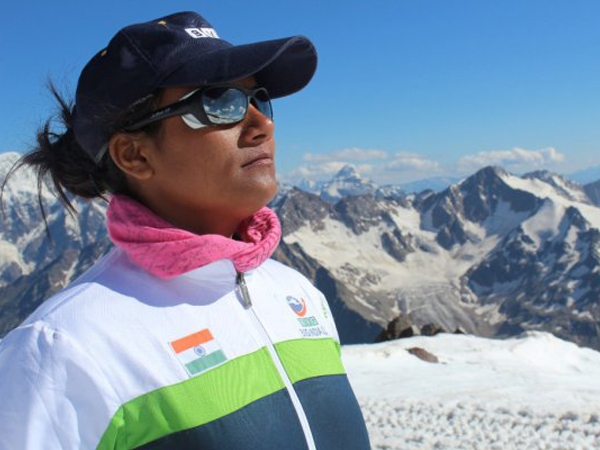Twenty three-year-old Janak Singh is a cricket champion. Having won five gold medals in the mini Para Olympic sports tournaments held in the UK, today he is not only playing the sport but also tutoring people to do the same. But his biggest achievement doesn’t lie in the medals and the glory, rather in the fact that he now plays cricket with everyone.
“Previously I was not even acknowledged on my own village’s cricket field, now I captain my village cricket team,” adds the young man with a smile. Janak, born in a village near Jodhpur, was affected by polio. He lost both his legs, but that doesn’t deter him from his mission. “Most of my neighbours and relatives now welcome me into their homes, and many of them encourage their children to spend time with me so that I can teach them how they too, can accomplish what I have done with my life so far. There was a time when they wouldn’t even incite me for family functions because, to them, I was a cursed child”
“Most importantly for me, no one now looks at me with pity in their eyes anymore,” he adds.
This is one of the many stories that Sneh Gupta, founder of Indiability has to share.
She came to India in 1996 to make a documentary and has stayed back ever since. Two decades later, she has founded Indiability, a sister concern of Sushila Shiksha Kendra Niketan (SSKN) and also got international recognition for the organisation.
“I think our biggest challenge, then and even now, has been social inclusion. India has a big stigma when it comes to disability. From considering disability to be bad luck and even a curse at times, I have seen many kids being left behind at SSKN just because their families didn’t want them. They fail to see that disabled kids also come with their own set of abilities, skills that we miss out on. Our main aim is to include these kids in the society and take away the negative connotation disability has.”
“We had come down to India to make a documentary on education. Since it was India’s 50th Independence, we were looking at featuring something special. That’s when we came across SSKN, a boarding school for disabled kids. I was amazed at the way they were giving disabled kids a chance at inclusion in society. These kids were not only studying but they were also doing extracurricular activities like rope malkham, playing cricket, and what not. It was beautiful to see these confident and self-assured kids as opposed to what we normally associate with disabled kids,” says Sneh.
Two years into the organisation and Sneh felt the need to start Indiability, SSKN’s sister concern. The reason for branching out was quite simple really. “I wanted to take SSKN to an international level. However, the first problem was in the name itself. Outside of India people weren’t too comfortable with pronouncing Sushila Shiksha Kendra Niketan, so we decided to make things simple and hence, Indiability was born.”
The core idea behind Indiability, just like SSKN, is really simple – social inclusion. Their flagship project, Indian Mixed Ability Group Events (IMAGE) operates in partnership with Laureus Sport for Good Foundation. The idea is to use sports as a medium to give disabled kids the needed confidence and also get both disabled and abled kids together in a competitive environment.
“The fact that we can get kids from both these sections together and compete sends out a message to everyone that disabled kids are no different. They have the same set of abilities and they can function just as well as the next person,” says Sneh, emphasising the fact that social inclusion through sports also means that kids grow up learning that disabled kids are the same as everyone else. “They don’t need to be pitied or given special status. All that they need is a society that lets them live a regular life and gives them equal opportunities.”
IMAGE takes pride in the fact that their volunteers are disabled kids themselves. “This is more than just a feel good factor. The fact that we have disabled kids going out there and presenting a positive example immediately gives hope to everyone else. ‘If he can do it, why can’t I?'”
“We’ve had cases where the disabled volunteers were mocked and called names by other kids but as and when they realise that these volunteers are as good as everyone else, they stop. We once had a volunteer with no hands. His ability to function just like everyone else by using his feet instead of his hands just left everyone amazed,” says Sneh.
Today IMAGE volunteers also hold to their credit the iVolunteer award, something that Sneh defines as the biggest career achievement. “If you ask me about my biggest accolade in my career I will have to say that this award sums it up for me. We still have a long, long way to go but this award is special. Our team was the only one who had disabled volunteers,” says Sneh with a smile.
But that’s not the only thing that is making her smile. “Two decades ago at SSKN, I remember that we use to have a number of kids left behind for the summer holidays. These were the kids who were considered to be a burden by their family members who wanted nothing to do with them. It took a lot of convincing and a lot of hard work, but today, the same kids are the most educated members in their families. They earn, they excel in what they do and their confidence is just amazing,” she adds.
Today Sneh keeps herself busy, researching on more ways to have social inclusion and make IMAGE more international. On those rare days that she is not working you’ll find her holed up in the kitchen, cooking. “It’s a great way to calm your mind and get you away from everyday things. I also love reading but these days the only thing on my bedside is research papers from Indiability; it’s my full time concern,” she signs off.
More On >> Balancing Act



